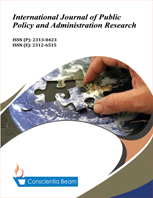Examining the integrity of whistleblowing systems and apparatus in the context of fraud prevention
DOI:
https://doi.org/10.18488/74.v11i4.4003Abstract
This study aims to analyze the impact of the whistleblowing system and personnel integrity on fraud prevention at the Inspectorate Offices in South Sulawesi Provincial and Makassar City, Indonesia. Using a quantitative research design, primary data were collected through electronic questionnaires distributed to 70 auditors in these offices. The relationship between the independent variables (whistleblowing system and personnel integrity) and the dependent variable (fraud prevention) was analyzed using multiple regression. The findings revealed that both variables positively and significantly influence fraud prevention. Specifically, the whistleblowing system enables early detection of fraudulent activities, while high personnel integrity is essential for effective fraud mitigation. These results support the hypothesis that robust whistleblowing mechanisms and strong integrity within institutions play a crucial role in preventing fraud. The study highlights the importance of fostering a culture of transparency and accountability by implementing an integrated whistleblowing system and encouraging individuals to report fraud or violations without fear of retribution. This is vital for maintaining organizational integrity and financial health. Thus, organizations should focus on establishing comprehensive strategies that enhance both whistleblowing mechanisms and personnel integrity to ensure effective fraud prevention and the promotion of ethical conduct within institutions.

